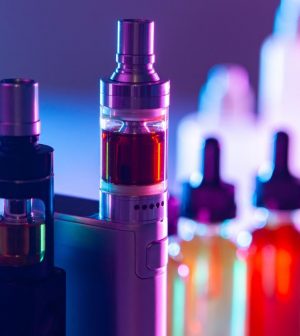- Could Your Grocery Store Meat Be Causing Recurring UTIs?
- Are You Making This Expensive Thermostat Error This Winter?
- Recognizing the Signs of Hypothyroidism
- 10 Strategies to Overcome Insomnia
- Could Artificial Sweeteners Be Aging the Brain Faster?
- Techniques for Soothing Your Nervous System
- Does the Water in Your House Smell Funny? Here’s Why
- Can a Daily Dose of Apple Cider Vinegar Actually Aid Weight Loss?
- 6 Health Beverages That Can Actually Spike Your Blood Sugar
- Treatment Options for Social Anxiety Disorder
Vendors of Synthetic Nicotine Vapes on Instagram Are Skirting FDA Rules

The U.S. Food and Drug Administration currently mandates strong health warnings when vapes containing synthetic nicotine are advertised on Instagram and other social media.
Trouble is, most vendors aren’t adhering to those rules meant to protect kids, a new study finds.
It’s a new phenomenon, said study co-author Traci Hong, professor of communication at Boston University.
“Because synthetic nicotine isn’t derived from tobacco, it evaded the regulatory authority of the FDA until April 2022,” Hong noted in a university news release. “This regulatory loophole allowed manufacturers to flood the market with synthetic nicotine products with flavors previously banned in traditional tobacco products due to their appeal to youth.
“Additionally, these products were often marketed as ‘tobacco-free nicotine,’ fostering positive perceptions and potentially increasing trial among youth,” she added.
The study was led by the University of Pennsylvania postdoctoral fellow Jiaxi Wu and published recently in the journal JAMA Network Open.
In the study, Wu and colleagues analyzed the content of more than 2,000 Instagram posts hawking various synthetic nicotine e-cigarette brands.
The only difference between synthetic and natural nicotine is that the former is created in a lab while the latter comes from the tobacco plant.
“Though very little is known regarding the health effects associated with synthetic nicotine use, it is pharmacologically similar to tobacco-derived nicotine and likely has similar addictive properties,”according to a UPenn news release.
Nicotine in any form can be especially harmful to kids and youths, negatively affecting brain development and psychosocial health, the researchers added.
Spurred on by that knowledge, the FDA in 2022 mandated that all synthetic nicotine vape products “include a health warning that takes up 20% of the advertising space and appears in the upper portion of the ad,” according to the UCSF news release.
But in their new Instagram-based analysis, Wu and Hong found that only 13% of the ads had warnings that conformed to the FDA mandates.
For example, health warnings might be placed away from the upper portion of the ad, even though “flavored [vape] posts with health warnings placed in the upper image portion received more likes than posts with warnings in the lower portion,” the researchers noted.
The makers of synthetic vapes have also been marketing flavored e-cigarettes that have artificial flavors, with ads “often showing visually appealing fruits or desserts,” according to the researchers.
“Companies also produce products in flavors previously banned in traditional tobacco products and cartridge-based e-cigarettes, like cotton candy and bubblegum, which youth are especially drawn to,” the UPenn news release said.
More information
Find out more about vapes with synthetic nicotine at the American Lung Association.
SOURCE: University of Pennsylvania, news release, Oct. 7, 2024
Source: HealthDay
Copyright © 2026 HealthDay. All rights reserved.










